
John Boorman’s Excalibur (1981) was one of those “happy accident” movies for me when I first saw it in 1981. I had no real interest in seeing it at the time, but I had ill-advisedly signed up for a college course in musical appreciation—a notion that came to an abrupt end when I realized I was going to be appreciating Haydn’s “Surprise” Symphony. But rather than explain that I was dropping the class to persons who would not be pleased, I went out dutifully every Tuesday night for several weeks—to the movies. And since Boorman’s take on the story of King Arthur and his cohorts was done in pure Wagnerian scale—with a lot of Wagner on the soundtrack—it also served to enhance my musical appreciation. And glad I am that I went, since this turned out to be one of my favorite films of the year, and far and away my favorite of this type of film. (And, yes, I include Peter Jackson’s Lord of the Rings films in that assessment.) Oh, it may have a few problems—not the least of which is that it sometimes gets perilously close to self-parody—but it’s one of the most stunning-looking films ever made, and in tackling the material head-on, it achieves a boldness of purpose that imbues the overall film with something at once truly mythic and surprisingly moving. After years of absurdly stoic, bizarrely clean and dramatically inert movies about knights bold and damsels fair, Boorman finally gives us one that feels grounded in sweaty, suffering humanity, a less bombastic take on magic and a true sense of being born of the British Isles. I’ll take some imperfections for that.

Seeing the film again in a newly remasterred Blu-ray version reminded me of what an incredible visual experience the film is. (It’s the season to bitch about Oscar slights. Look no further than not giving Alex Thomson the award for cinematography on this.) When the film was being made, there was a certain amount of bafflement in some quarters over Boorman’s insistence on placing green gels over many of the lights for the forest scenes, but when you see the film’s glowing greens it makes perfect sense, especially within the context of the film.The film presents the Earth and the things that grow out of it as virtually characters in their own rights—certainly as living things. In fact, the film’s concept of “the dragon” (one that annoyed some) was that the Earth is the dragon, not some gigantic separate beast. Merlin (Nicol Williamson) himself expresses that the film is taking place in a world not far removed from when “bird and beast and flower were one with man.” In fact, the film takes place—again as said by Merlin—when such a magical time is giving way to the time of man.
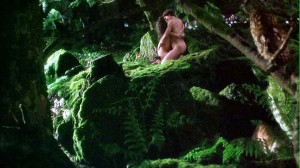
Boorman’s decision to present the film in terms of Wagner’s operas affords it a unity it might not otherwise have—and anyway, there are certainly connections between the Arthurian legends and the ones in Wagner. Certainly treating Lancelot (Nicolas Clay) and Guenevere (Cherie Lunghi) as Tristan and Isolde is reasonable enough, since that story predated the Arthurian tales and influenced them. In a way, it’s all part of Boorman’s apparent to desire to create a work that is at once sweeping and mythical, yet earthy and real in a way that previous films had never been. Whether Messrs. Malory and Wagner would agree with the approach is another matter. Then again, you could always show them Richard Thorpe’s Knights of the Round Table (1954). That would almost certainly shut them up.
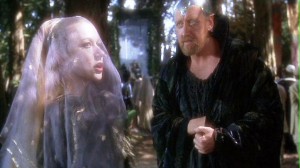
The whole thing was a risky proposition—and it didn’t pan out for everybody. There are still those who are cheesed over an allegorical dragon rather than the fire-breathing special effects sort. When the much lesser Dragonslayer opened a few months later, some critics compared Excalibur unfavorably to it because “it at least has dragons.” Oh well, what can you do with the literal-minded? Much more risky, however, was the very fact that Excalibur took itself seriously and wasn’t a simple adventure, which was very much at odds with the tenor of the early ‘80s and its generally Lucas-Spielberg vibe. Booorman and company are offering something quite different.
In some respects, the film’s seriousness does work against it. It actually is kind of hard to suppress some quiet mirth over Uther Pendragon’s (Gabriel Byrne) lustful—and presumably uncomfortable—coupling with Igrayne (Katrine Boorman) while not stopping to remove his armor. (I don’t claim to be an authority on suits of armor, but I should think this would be awkward to say the least.) It stops short of being outright funny, however, by virtue of its sheer intensity and the intercutting between this and the real Duke (Corin Redgrave), whom Igrayne is bewitched into believing Uther is, who is at that moment dying on the battlefield.
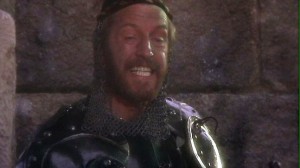
Not everything is quite this fortunate. I suppose it’s reasonable enough that Boorman and company just chose to ignore that Monty Python and the Holy Grail (1975) existed, but there are moments where that earlier film seems to have been parodying this one—one that hadn’t been made yet. However, there are moments here and there where Excalibur just gets too close to that parody for comfort. In fact, I can’t watch the scene where the aforementioned Duke taunts Uther’s men with, “You’ll never batter this down! And you’ll never have Igrayne!” and not expect him to further say something about someone’s father smelling of eldrberries. But all in all, the serious tone works more often than it doesn’t.
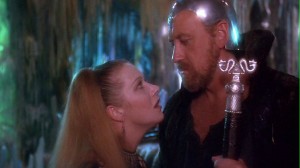
That brings us to the most contentious point of the movie—Nicol Williamson’s portrayal of Merlin. Personally, I’m of the opinion that his eccentric Merlin gives the movie exactly the balance it needs. He oughtn’t be like the other characters in any way. He should be both larger-than-life and slightly amused by the stumblings, fumblings, and foibles of the people he deals with—and at the same time saddened by these things. He’s almost a god figure, who finds people endearing and frustrating in equal measure. That he’s capable of surprise at one point (“I never saw this”) is his most human moment in that he’s so obviously positively pleased less by the surprise than by the fact that his world-weary self can be surprised.

For me, there’s just enough camp here without being too much. The fact that he sounds most awfully like Jethro Tull’s Ian Anderson is probably coincidental, but it works in a strange way (and goodness knows, Anderson himself is more than a little steeped in British Isles mythology, which makes it that much better). There’s also more than a little of Old Nick (Ronald Pickup) introducing young Mahler (Gary Rich) to nature from Ken Russell’s Mahler in the scenes in the woods where Merlin first shows Arthur something of nature. But all in all, it’s not a jokey characterization at all. I see no winking at the audience. Others, I know, do, but I’m missing it. Merlin is a big character and he should be played as such. (Based on the alternate take used in the film’s trailer where he says, “Look into the eyes of the dragon and despair,” Williamson was sometimes even bigger than in the finished film.) I would concede that the two instances of knockabout comedy involving Merlin were probably a bad idea, but otherwise, I have no issue with this Merlin. Indeed, I can’t imagine the film without him. I know at least one person who will disagree, but then I know another who recently opined that while he had reservations about the portrayal, he had to admit that the film tended to bog down once Merlin was out of the picture.



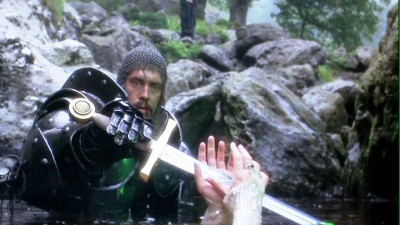
This is easily my favorite Boorman movie. As I told Ken earlier this week, Williamson is the DEFINITIVE Merlin as far as I’m concerned. He’s out of place, out of time, campy enough to be comic relief but also a little creepy. He’s a perfect modern foil without actually taking away from the film. If you want the old man with a beard, you can have Gandalf.
I’m not one of the ones arguing the point, of course.
I loved Williamson as Merlin. In fact my three favorite Williamson roles were all British legends: Merlin in Excalibur, Sherlock Holmes in The Seven Percent Solution, and Little John in Robin and Marian.
It is a shame that his volatility cost him a number of roles and also that he passed away recently.
I really need to see Robin and Marian again.
Excellent review of a very good film, one of my favorites in ANY genre. I suppose I’ll have to get the BluRay version now…
Excalibur is one of my favorite films of all time. As far as I’m concerned, the only thing wrong with it is that it makes much of Boorman’s subsequent output look almost chastened by comparison. Of course, I’m a Kurosawa fanatic, so I may simply have an abnormally high tolerance for ham.
I must, Boorman’s proposed adaptation of The Fellowship of the Ring is one of two I would almost have preferred to Jackson’s — the other, of course, being Kubrick’s version with the Beatles in the starring roles.
Kubrick’s version with the Beatles in the starring roles
Tentatively called One Ringo to Rule Them All? And would it, as a friend of mine suggested elsewhere, have had Victor Spinetti as Saruman saying, “With a ring like that I could — dare I say it? — rule the world.”?
I bow to your superior wit!
Bear in mind, I didn’t come up with that second bit…and I am deeply ashamed of myself that I didn’t. Me missing the chance to use a quote from Help! is just dire.
Such an amazing film. It puts to shame so much in the so-called “fantasy” genre. Every other Arthurian film bores the death out of me. I love the messy interaction between paganism and christianity. Merlin has that great line “It is a time for men and their quarrels”.